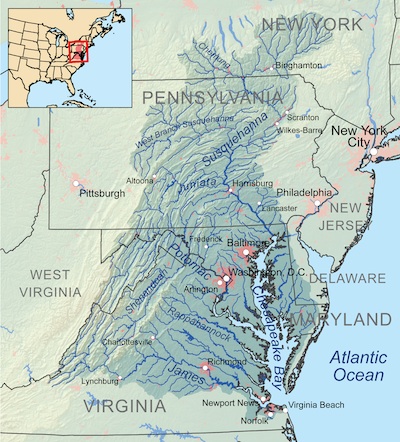The Conowingo Scandal
 Saturday, September 27, 2014 at 7:32PM
Saturday, September 27, 2014 at 7:32PM Saving the Chesapeake starts at the Conowingo Dam.
 chesapeake bay in
chesapeake bay in  Conservation,
Conservation,  Dams,
Dams,  Environment,
Environment,  Film and Video
Film and Video  Saturday, September 27, 2014 at 7:32PM
Saturday, September 27, 2014 at 7:32PM Saving the Chesapeake starts at the Conowingo Dam.
 chesapeake bay in
chesapeake bay in  Conservation,
Conservation,  Dams,
Dams,  Environment,
Environment,  Film and Video
Film and Video  Monday, April 28, 2014 at 12:00AM
Monday, April 28, 2014 at 12:00AM 
Last week we were horrified to learn that there are 21 Attorney Generals from states no where near the Chesapeake Bay filing suit to stop the EPA's clean up plan for the bay.
In response several major cities and conservation groups are rallying to support the clean up effort.
Six major U.S. cities — New York, Baltimore, Chicago, Philadelphia, Los Angeles and San Francisco — filed an amicus brief this week in support of the EPA-led Chesapeake Bay cleanup plan, which imposes limits on the level of nutrients that can enter the bay each day. Four Florida conservation groups also submitted a brief in support of the cleanup plan, adding additional out-of-state support to a contest that for the past few months has been between the six Chesapeake Bay states and the 21 states, backed by major agriculture groups, that oppose the plan.
LINK (via:Think Progress)
 Tuesday, April 22, 2014 at 12:00AM
Tuesday, April 22, 2014 at 12:00AM 
This is unbelievable.
Earlier this year, a group of 21 Attorneys General from states as far away from the Chesapeake Bay as Alaska and Wyoming submitted an amicus brief that aims to strike down the EPA’s Chesapeake cleanup plan. The AGs argue that the cleanup plan raises serious concerns about states’ rights, and they worry that if the plan is left to stand, the EPA could enact similar pollution limits on watersheds such as the Mississippi.
LINK (via:Climate Progress)
States rights? The EPA cleanup plan was created at the request of the six Chesapeake Bay states.
 chesapeake bay in
chesapeake bay in  Conservation,
Conservation,  Environment
Environment  Sunday, February 1, 2009 at 4:31PM
Sunday, February 1, 2009 at 4:31PM
This investigation started in 2003.
State and federal investigators have broken up a black market involving watermen and fish dealers who sold millions of dollars' worth of striped bass, illegally taken from the Chesapeake Bay and Potomac River, to shops and restaurants across the country, according to court documents filed in federal court this week.
Annually, Maryland's 1,231 licensed watermen account for about 2
million pounds of the 7 million pounds of striped bass legally caught
commercially on the Eastern Seaboard. The poaching scheme described in
court documents and by sources means that the state vastly exceeded its
annual striped bass quota for five years.
LINK (Via:The Baltimore Sun)
 chesapeake bay,
chesapeake bay,  commercial fishing,
commercial fishing,  maryland,
maryland,  potomac river,
potomac river,  striper in
striper in  News
News